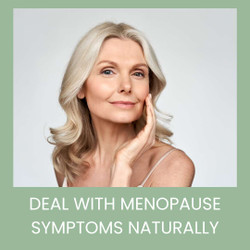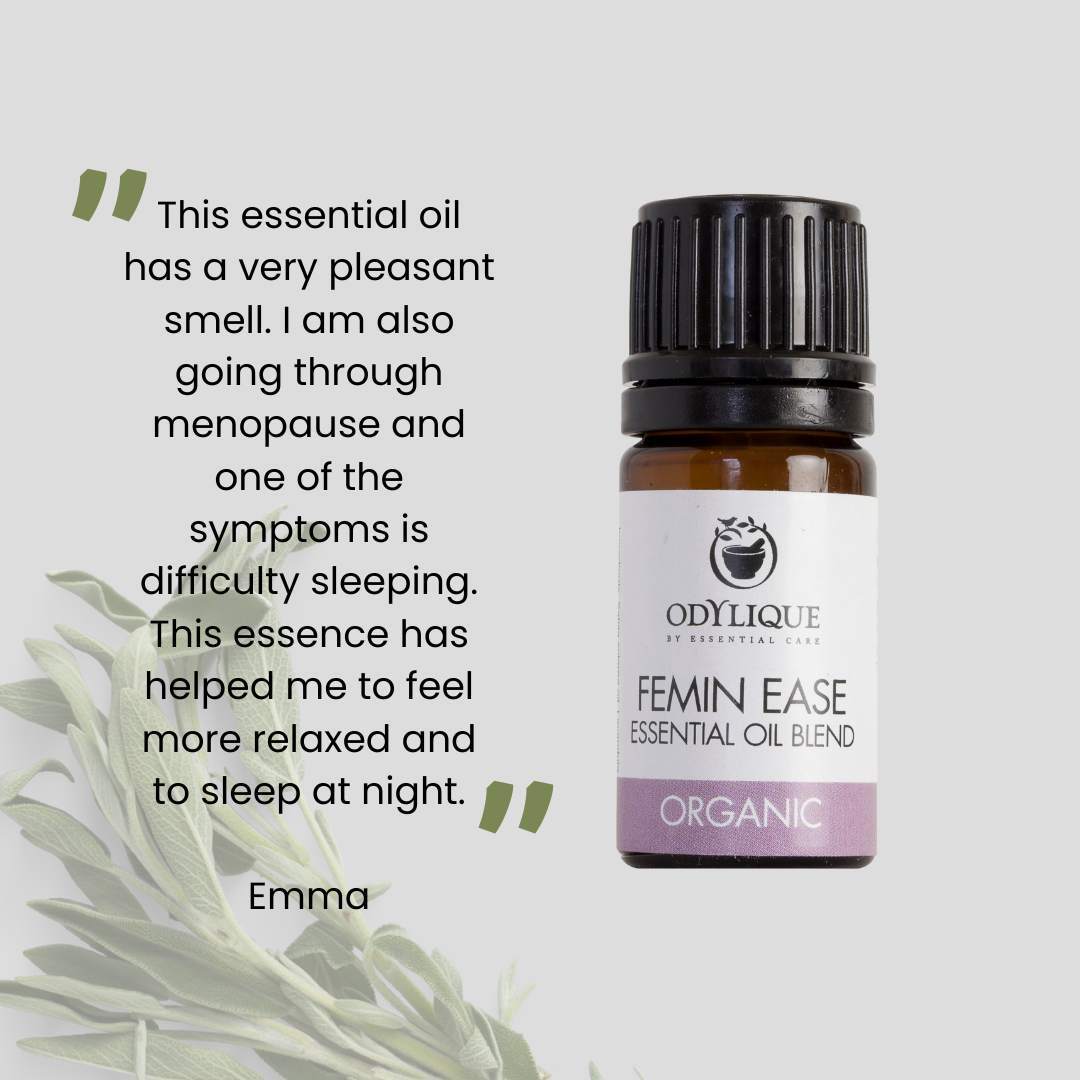Menopause is a natural biological process that every woman goes through at the end of our reproductive years. It typically starts between the ages of 45 and 55, but can occur earlier or later. (Perimenopause, the time when our hormones and fertility start to drop, can start as early as our late 30s.) Menopause, the end of menstruation, is associated with substantial changes in oestrogen and progesterone levels.
Some people breeze through perimenopause and menopause with very few symptoms. But it’s common to experience issues including hot flushes, sleep disturbance, itchy or dry skin, acne, greasy or thinning hair, anxiety, brain fog, fatigue and vaginal dryness. Not surprisingly, this isn’t something everyone looks forward to.
Equally unsurprisingly, many women opt for hormone replacement therapy (HRT) to alleviate menopause symptoms. And swear by it.
But this article is for the not insignificant number of women who’d prefer an alternative. We'll explore different ways of how to deal with menopause symptoms naturally, including:
- Natural Therapies
- Food / Diet
- Nutritional Supplements
- Exercise
- Skin Care
Natural Therapies for Menopause
It's essential to understand that menopause is not a disease or illness - it's merely another life-phase. There are several natural or alternative therapies for menopause that can improve wellbeing.
One is acupuncture, which has been shown to significantly reduce hot flushes compared to a placebo treatment.
Another is aromatherapy, which can help with anxiety, mood swings and sleep disturbances. A few drops of pure essential oil blend such as our Femin Ease in a burner or bath can calm the mind and promote a restful night’s sleep.
Yoga and meditation are also popular mind-body therapies that can help relieve stress and promote relaxation.
Foods that Help with Menopause Symptoms
Certain foods can help reduce the severity of menopausal symptoms and promote overall health. For instance, consuming foods rich in phytoestrogens like soybeans, flaxseeds, chickpeas and lentils can mimic oestrogen in the body and help regulate hormonal fluctuations.
Incorporating more calcium-rich foods such as leafy greens, almonds and fortified tofu into your diet can also support bone health and prevent osteoporosis - a common concern for postmenopausal women.
Increasing your intake of antioxidant-rich fruits like berries and citrus fruits can benefit cognitive function by reducing oxidative stress on brain cells.
Nutritionists also recommend a diet rich in Vitamin E (see below re supplements) for example avocados, nuts and seeds, and plant oils like olive oil.
And steering clear of sugary drinks or processed snacks is important during menopause since sugar increases inflammation levels which exacerbate hot flushes. (The same goes for too much alcohol too.) Fresh produce or whole grains are ideal since they are nutrient-dense and have anti-inflammatory properties that soothe uncomfortable menopausal symptoms.
Herbal Teas for Menopause
Drinking plenty of non-caffeinated fluid is a vital weapon against dry skin, which is a typical symptom of perimenopause and menopause.
Herbal teas are a great alternative to plain old H2O and have been used for centuries to treat menopause symptoms.
One of the most popular herbal teas for menopause is black cohosh. This herb has shown promising results in reducing hot flushes and improving sleep quality. It works by mimicking oestrogen's effects on the body without actually increasing oestrogen levels.
Red clover tea may be another option for managing menopausal symptoms naturally. It contains phytoestrogens that can help balance hormone levels, reduce anxiety and depression, and improve bone density.
Sage tea is also known for its beneficial properties for women experiencing sweating at night or disturbed sleep patterns.
Nutritional Supplements for Menopause
Black cohosh, red clover and sage are all available in supplement form too. And happily, there are several more readily available supplements that can tackle menopause symptoms, with research on efficacy mounting rapidly.
Sage
Recent research in Switzerland revealed that Sage taken daily for 4 weeks could reduce hot flushes by 50%. This increased to 64% within eight weeks of taking regularly.
The same study also showed beneficial effects of sage on psychological menopause symptoms, such as mood swings, again reducing them by around half.
You can buy Sage supplements by Lamberts Healthcare .
Ginkgo Biloba
Brain fog? It’s a common problem at many times of life, but can be a particular issue during menopause. Ginkgo biloba is believed to help sharpen the mind. Available here .
Vitamin E
A 2007 study reported that menopausal women taking 400mcg of vitamin E every day for four weeks experienced fewer and less severe hot flushes.
Vitamin E can, taken via supplements, but also topically in good quality skincare (see below) also help relieve common skin issues such as menopause itchy skin.
Soy
Soy is an oestrogenic plant, which means it can mimic the effects of oestrogen in the body.
Soy has been widely studied for its impact on symptoms of the menopause, particularly hot flushes and night sweats. This is why it’s commonly recommended among herbal remedies for menopause.
Lamberts make a very good quality Soya Isoflavone supplement available here .
St John's Wort
Research published in 2019 notes that some women have found St John's Wort can reduce their hot flushes and night sweats during menopause. St John’s Wort is prescribed in Germany as an alternative to anti-depressants and is known as a mood booster and reliever of anxiety.
Magnesium
Magnesium contributes to the maintenance of normal bones and the normal functioning of the nervous system. Magnesium levels typically decrease along with oestrogen in perimenopausal years, which can cause issues including fatigue and migraines. A convenient form of high quality magnesium produced by Lamberts Healthcare is available here.
If you’re looking for an all-round supplement that covers many bases rather than taking several different tablets, consider a multi-vitamin like Lamberts Fema45+. It is particularly designed to help combat fatigue, and contains a wealth of nutrients that are at risk of depletion. The formula provides 28 of them in fact, at relevant levels, including Vitamin E, magnesium, B vitamins, vitamins D and K and calcium.
N.B. Particularly if you have any pre-existing health condition, discuss taking supplements with your doctor or health practitioner first and always check the recommended dosage.
Exercise for Menopause
One natural way to deal with menopause symptoms is through exercise. Although it may seem counterintuitive, exercising can actually alleviate some of the common symptoms of menopause such as hot flushes, mood swings, and weight gain.
Engaging in regular physical activity can help regulate hormone levels and improve overall mood. It also helps maintain a healthy body weight which is important during this time when metabolism tends to slow down.
The type of exercise doesn't matter as much as consistency. Whether it's walking, swimming or yoga - the key is to find an activity that you enjoy doing and stick with it for at least 30 minutes per day.
In addition to improving physical health, exercise can also provide mental health benefits by reducing stress levels and promoting relaxation. This is especially beneficial for those experiencing anxiety or depression.
It's important to consult with a doctor before starting any new exercise routine, especially if you have underlying medical conditions. But once given the green light – start moving! Exercise can be one of your best allies in dealing with menopausal symptoms naturally.
Menopause Skin Care
Our skin is often one of the first things to show the signs of perimenopause and menopause.
The most common symptoms are increased sensitivity, redness, itching, as well as wrinkling, thinning and dryness (caused by a decline in collagen)
At Odylique we have a range of gentle, hypoallergenic products that help address many of these concerns with soothing, nourishing ingredients rich in vitamin E and other vital nutrients.
Dry Skin / Reduction in Collagen: Our 3 organic facial moisturisers and Superfruit Concentrate facial oil contain high levels of antioxidants as well as phytonutrients that help boost collagen synthesis. Prebiotic Rich Hydration Cream also contains a special vegan plant collagen to combat the collagen decline that’s common in perimenopause.
For dry skin, consider also our highly effective, moisturising Silk-Touch Cleanser .
Hot flushes can be eased with Calming Rose Petal Tonic which provides a wonderfully cooling facial mist. Rose is a fascinating flower as it has the ability to soothe and calm sensitive skin, helping to reduce redness, as well as being a mood-booster and skin regenerator.
Our 45+ Skin Care Bundle contains an ideal selection of products to support the skin through perimenopause and menopause. It includes the Calming Rose Tonic, Silk Touch Cleanser, Prebiotic Rich Hydration Cream and Superfruit Concentrate.
Itching, which often happens at night, is caused by hormone fluctuations, and often, stress. If you experience itchy skin, Repair Lotion is ideal all over the body, with chickweed and chamomile to help calm irritation.
Spots or Acne: Our Spot on Serum may provide a soothing aid for skin that is prone to perimenopausal acne .
Hair Problems: As well as thinning hair and itchy scalp during menopause , another menopausal side effect can be greasy hair from an increase in scalp sebum production as levels of the hormone androgen surge. Natural shampoos can help here.
Our wider selection of menopause skincare products > here .
It's essential to take care of yourself during menopause. Remember that what works for one woman may not work for another, so experiment with different approaches until you find what works best for you.
Disclaimer: The advice in this article is for information only and should not replace medical care. Please check with your GP or healthcare professional before trying any supplements, treatments or remedies. Food supplements must not be used as a substitute for a varied and balanced diet and a healthy lifestyle.





